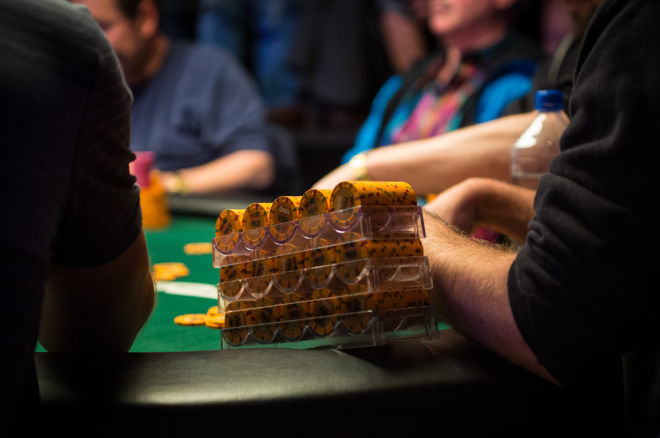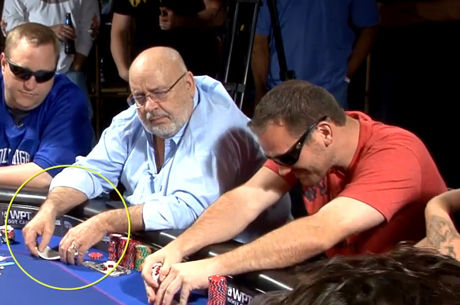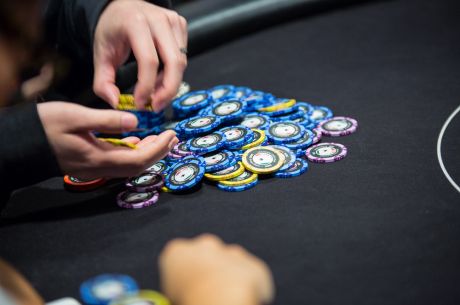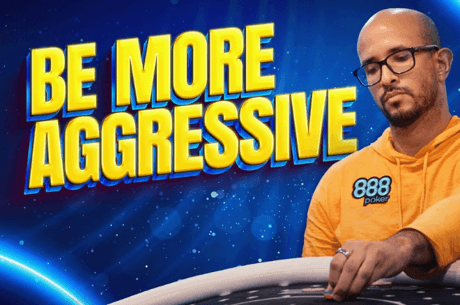Book the Win: Advice on Breaking a Losing Streak

Recently I walked away from a cash poker game after the shortest session I��ve played in several years. Let me tell you about it.
I was at the only legal card room in my state, Harrah��s Cherokee. I more than doubled up in the first five minutes at the table, when I flopped trip threes with my 6?3? to crack another player��s aces. Over the next couple of orbits I raised with 8?7? and flopped trip sevens, then raised with KxQx-offsuit and flopped trip queens. In the last hand I played, I raised with Q?9?, flopped 7x8xJx for a gutshot straight draw, hit it with a 10x on the turn, and felted a player who had flopped top two pair with Jx8x.
I had started with $200 in play, and now had $595 after 35 minutes. The technical poker term for this kind of luck is ��running like a god.��
The question then became the one famously asked by The Clash in 1982: ��Should I stay or should I go?��
There were compelling arguments for my continuing to play:
- It��s an hour��s drive each way, so it didn��t make much sense for me to play half an hour and then quit.
- This was obviously a table with players willing to pay off my big hands, an essential ingredient for making a big payday.
- I now had a fearsome table image, and should have been able to bully, intimidate, and bluff to my heart��s content.
Normally, those considerations would indeed be enough to keep my keister planted in that seat for as long as conditions remained so favorable. This time, however, there were countervailing factors in play.
They all stemmed from the fact that I was having one of those losing streaks that are inevitable if you play poker. Specifically, I had lost the last six times in a row that I had played at Cherokee. I was feeling snakebit. In fact, not long before on the drive to the casino, I had been actively suppressing thoughts that I shouldn��t bother with this trip, because I was just going to lose again.
Losing streaks can wreak havoc on one��s mindset. Jesse May described this in his poker novel, Shut Up and Deal:
Then I go on a losing streak. Or have one bad night, or whatever. Just something that makes me question everything I know about poker �� no, everything I believe �� and consider giving up and be scared to go in the card room and not know when to fold or when to raise or when to play or when to stop.
But the best description of the psychological effects of a losing streak I��ve ever read comes from Larry Phillips��s little book, The Tao of Poker:
Maybe you��re in over your head; maybe you never understood this game from Day One and you've been fooling yourself all along. Your opponents had your number all along and you didn't know it. Oh sure, a period occurred when you were running well, and that threw them off briefly �� and allowed you to keep the fiction going to yourself �� but by and large they had your number all along.
All real gamblers know the Inner Scream. It's like the face in that one painting, ��The Scream,�� the oval-headed guy with his mouth open and his hands on his cheeks. It��s exactly like that, only it��s on the inside. It��s a scream for just average luck, not even for good luck anymore. For that wondrous state of affairs where, every time you get annihilated, there is some kind of offsetting win of some kind, somewhere. It is pleading just to break even.
I wasn��t quite to that point yet, but things were heading that way. I wanted to put an end to it.
A direct consequence of this state of affairs was that after that last big addition to my stack, I could feel myself starting to get defensive. I wanted to protect my win. I could foresee that as a result I was going to start playing more cautiously.
Cautious poker is weak poker. It��s bad poker. It��s losing poker. In order to win, you have to be willing to lose �� and I wasn��t. I had reached a point where I was sensing my own unwillingness to risk loss. That kind of tentativeness and fear is incompatible with strong play.
Tommy Angelo gave this piece of excellent advice in his book Elements of Poker:
When you are winning, and you reach a point in the session when the happiness you will gain by winning more money will be much less than the pain you will endure if you lose, quit. Away from the table you can examine how and why this imbalance occurs. Meanwhile, learn to trust the quitting voice, and to react without question.
That perfectly describes where my mind was.
Finally, I remembered this advice from Ed Miller:
Go ahead and book a win. I know a lot of people think booking wins and setting stop losses is hogwash. But playing top poker (particularly no-limit) requires confidence in yourself and your decision-making. And if you lose seven days straight, your confidence is likely going to be in the can no matter who you are. So if you start a session and you��re up a few buy-ins after a bit, wrap it up. Book the win. And pat yourself on the back. You��ll be more confident during your next session.
So that��s what I did.
Could I have won more money �� maybe a lot more �� if I had stayed? Sure, maybe. Or maybe disaster would have struck, and I would have left feeling even more loser-y than when I began, which would make it even harder for me to overcome the psychological baggage of the bad streak the next time I played.
I was winning, I was mentally fresh, and I was in a situation that looked favorable to continue winning more. Ordinarily, it��s a huge mistake to leave a poker game under those conditions. But once in a while, it��s reasonable to let other considerations prevail.
After all, as The Clash��s song says, ��If I go there will be trouble / And if I stay it will be double.��
Robert Woolley lives in Asheville, NC. He spent several years in Las Vegas and chronicled his life in poker on the ��Poker Grump�� blog.
Want to stay atop all the latest in the poker world? If so, make sure to get PokerNews updates on your social media outlets. Follow us on Twitter and find us on both Facebook and Google+!









